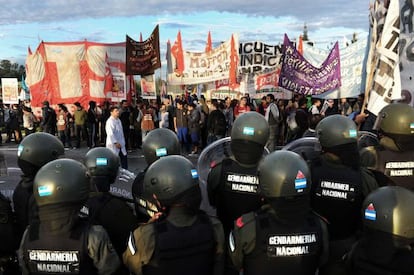Police clash with protestors trying to block road in Argentina general strike
Unions are demanding pay hikes of up to 40 percent to help deal with accelerating living costs

Police battled with a large group of protestors who tried to block a major highway in Buenos Aires on Thursday as a 24-hour general strike called by a veteran labor leader got underway in Argentina.
With public transport services not operating, thousands of people in the capital found themselves unable to get to work. Many major street intersections in Buenos Aires, such as Corrientes with Callao and Córdoba with Junín, were blocked by strikers in an effort to keep people at home.
The strike was called by teamster Hugo Moyano, who was once a government ally, and supported by the food and beverage industries and the opposition wing of the powerful General Workers Confederation (CGT), to demand that the government raise salaries by at least 40 percent this year. Strike leaders have also called on the administration of President Cristina Fernández de Kirchner to lower the tax exemption scales that are applied to workers’ salaries.
Argentina is going through one of its toughest economic periods in a decade with inflation pegged at around 32 percent and soaring unemployment. Dollar shortages forced the government to devalue the peso earlier this year as it lifted controls on currency exchanges.
Argentina is going through one of its toughest economic periods in a decade with inflation at 32 percent
As he took part in a street protest, leftist Deputy Néstor Pitrola said “not a soul” could be seen on the streets, adding that the country’s major industries had to shut down their operations. “All work has stopped at Ford, Kraft, PepsiCo, Stani and Fate; absenteeism at Volkswagen is also very high,” he told the Buenos Aires daily La Nación.
During his daily news conference, Jorge Capitanich, the president’s chief of staff, played down the strike, calling it “a big national picket line with a transportation stoppage.” He urged union leaders not to foment violence and to report any incidents among their supporters to the authorities.
In the morning, national police officers fired rubber bullets as they tried to break up a large group of leftist protestors who blocked a section of the Pan-American Highway near the Buenos Aires’ district of General Pacheco, daily Clarín reported on its website. Dozens of people, including officers, were injured and police made several arrests.
Moyano and the head of the powerful food and beverage union sector, Luis Barrionuevo, have said they are against the setting up of roadblocks because they impede a person’s right to free movement within the country. Roadblocks are a common form of protest in Argentina with many citizens resigned to the fact that they may have to wait longer to get to their destinations when they occur.
This is the second general strike that Fernández de Kirchner has had to deal with in her two-term administration. On November 20, 2012, Argentineans were left stranded after Moyano and Pablo Micheli, the leader of the CGT dissident wing, joined forces to call a nationwide transportation strike that also stopped deliveries of fuel and essential goods to many cities.
Tu suscripción se está usando en otro dispositivo
¿Quieres añadir otro usuario a tu suscripción?
Si continúas leyendo en este dispositivo, no se podrá leer en el otro.
FlechaTu suscripción se está usando en otro dispositivo y solo puedes acceder a EL PAÍS desde un dispositivo a la vez.
Si quieres compartir tu cuenta, cambia tu suscripción a la modalidad Premium, así podrás añadir otro usuario. Cada uno accederá con su propia cuenta de email, lo que os permitirá personalizar vuestra experiencia en EL PAÍS.
¿Tienes una suscripción de empresa? Accede aquí para contratar más cuentas.
En el caso de no saber quién está usando tu cuenta, te recomendamos cambiar tu contraseña aquí.
Si decides continuar compartiendo tu cuenta, este mensaje se mostrará en tu dispositivo y en el de la otra persona que está usando tu cuenta de forma indefinida, afectando a tu experiencia de lectura. Puedes consultar aquí los términos y condiciones de la suscripción digital.








































